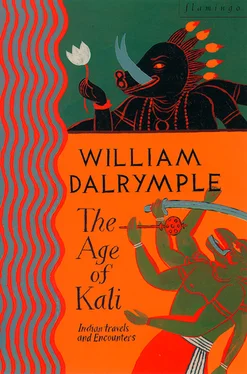‘My mother was a strong woman,’ she said. ‘But she had a haemorrhage two years ago and after that she just withered away. Now she just lies on this bed. If I could afford to give her just one glass of fruit juice she would be better than she is. I want her to die without pain, but I am consumed by the thought that if something bad happens we could not afford medical treatment.’
‘It is all fate.’ It was the mother speaking. ‘When we were young we never imagined this would be our end.’
‘We were a landowning family,’ explained Kanaklatha. ‘Now we have to beg to survive. Even now I’m full of shame when I beg, thinking I am from a good family. It is the same with all the widows. Our usefulness is past. We are all rejects. This is our karma .’
‘Only Govinda knows our pain and misery,’ said her mother. ‘No one else could understand.’
‘Yet compared to some of the others …’
‘What do you mean?’ I asked.
‘Some of the other widows. At least we are together. But many women I know were thrown out of their houses by their own children. When their sons discover that they are begging on the streets of Vrindavan they are forbidden from writing to their grandchildren.
‘We haven’t committed a crime,’ said the old lady. ‘Why should we go through all this?’
‘Sometimes I think even sati would have been preferable to the life of a widow,’ said Kanaklatha. ‘At the time, burning on my husband’s pyre seemed horrible. But after living through so much pain and misery, I wonder whether sati would not have been the better option. Now all I want is to serve Govinda and my mother, and spend the rest of the time in prayer. Here, come inside, see my little Krishna.’
Kanaklatha indicated that I should step over her mother. She pointed to the end of her tiny room. There, raised up on a wooden bench beside a small paraffin stove stood a pair of small brass idols of Krishna, each dressed in saffron dolls’ clothes. One figure showed Krishna as a child; the other as a youth, dancing with a flute in his hands.
‘Look at his beauty!’ said Kanaklatha. ‘Every day I bathe him and change his clothes and give him food. Krishna is my protector. He cannot resist the entreaties of any woman.’
She walked over to the shrine and bowed her head before the images.
‘Sometimes when I am asleep he comes to me,’ she said. ‘I tell him my sorrows and he tells me how to cope. But the moment I awake, he disappears …’
That evening, in a nearby temple, I met Kanaklatha’s landlord, a Brahmin priest named Pundit Krishna Gopal Shukla.
‘If those women die tomorrow,’ he said, spitting on the floor, ‘I will have to bear the expense of cremation. It should be the ashram ’s responsibility. They get so much money from pilgrims. I do so much for these widows already. I rent them a room. I even give them free water.’
According to Shukla, the widows’ ashrams in Vrindavan were increasingly set up by Delhi businessmen as a means to launder black money. They would give donations to their ashrams and receive receipts stating that they had given much larger amounts, which would be written off against tax. As far as the ashram owners were concerned, the widows were just a means to a financial end, a quick route to a clever tax dodge.
There was no doubting the very considerable funds the ashrams of Vrindavan receive. One medium-sized one attracted donations by undertaking to erect an inscribed marble plaque recording the name of any devotee who gave at least two thousand rupees (£40), and promising that the widows would sing bhajans for the donor ‘for the next seven generations’. The resulting plaques covered not only every wall in the hangar-sized building, but also its floor and ceiling. Many of the donors turned out to be British Hindus: next to plaques recording donations from Agra, Varanasi and Calcutta were a number from rather less exotic centres of Hindu culture such as Southall, Northolt and Leicester.
‘They treat the old women very badly,’ said Shukla. ‘They show them no respect. They give them less than the minimum on which they can survive. Some of the ashrams even demand a down-payment from the widows when they first arrive. They say it is to cover the cost of their cremation, but after a death they simply put the woman’s body in a sack and throw it in the Jumna.’
Shukla walked with me along the parikrama , through the crowded streets of the town. As we walked, we passed long lines of widows, all shaven-headed and with begging-bowls stretched towards us.
‘My family have been priests in Vrindavan for many generations,’ said Shukla as we walked. ‘The town used to be very beautiful. But now it has expanded and become very dirty and polluted. Before, people came here and they found peace. Now they just find corruption and mental pollution.’
I asked the priest about the stories that appeared occasionally in the Indian press claiming that the ashram managers were in the habit of taking beautiful teenage widows as concubines, or selling them at ten thousand rupees (£200) a time.
‘It happens,’ he said. ‘Many of the ashrams are now run by criminal elements. Even some of the sadhus are involved. They lure young girls in, then sell them to local landowners. When the landowners are finished with them, they can sell them to the brothels in Delhi. They pay the police off, so they don’t intervene.’
What Shukla said was confirmed by local women’s groups: ‘Go to the villages around Vrindavan,’ said Kamala Ghosh, ‘and you’ll see that all the landowners have little widows as mistresses. When they tire of them the widows are sold to whorehouses in Delhi and Bombay. And we have had widows here as young as ten.’ Among those I talked to in Vrindavan, there was agreement that nothing was being done to save the widows from such exploitation, least of all by the police.
Shukla and I were now standing outside the Shri Bhagwan Bhajan ashram , the biggest of them all, where I had met Kanaklatha that morning. A prayer shift had just finished and the street was full of tired old women in white saris. On the steps of the ashram sat a fat man in white homespun who Shukla pointed out as one of the managers. I asked him about the allegations, but the fat man simply shrugged.
‘The widows come here because they love Krishna,’ he said. ‘After they sing we give them some rice and two rupees. That is our duty. But we are not their keepers. What they do when they go is their business.’
Inside, the ashram consisted of two vast halls. On the floor of each squatted about a thousand widows in their identical white saris. Most of them seemed to be in their fifties or sixties, but there was a thin scattering of much younger women, while around the edge of the hall, leaning against the walls, or occasionally completely prostrate on the ground, were a number of much older women. Some of them were clearly mentally disturbed, letting out high-pitched shrieks like wounded birds, while others compulsively combed their hair or brushed away imaginary flies. The windows of the two halls were shuttered, and the only light came from a pair of naked bulbs suspended from the centre of the ceiling, leaving the edges of the rooms in a deep, Dickensian darkness. The whole establishment stank of urine and dirty linen.
Then a woman stood up in the centre of each room and began clashing cymbals; from another place a bell started to ring. A new shift was beginning. A cantor started up the chant, answered by two thousand widows singing as one, on and on, faster and faster: ‘ Hare Ram, Hare Krishna, Hare Ram, Hare Krishna … ’
Читать дальше












